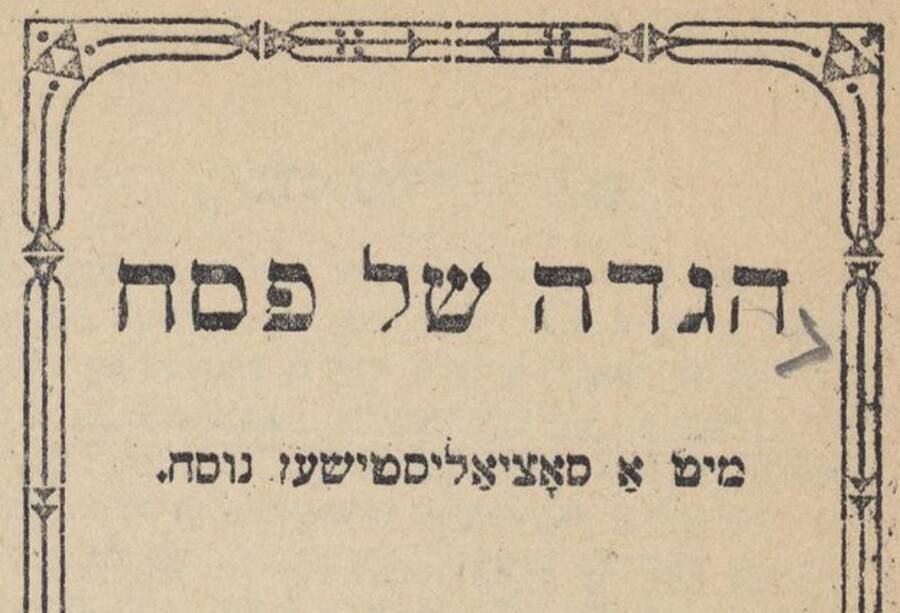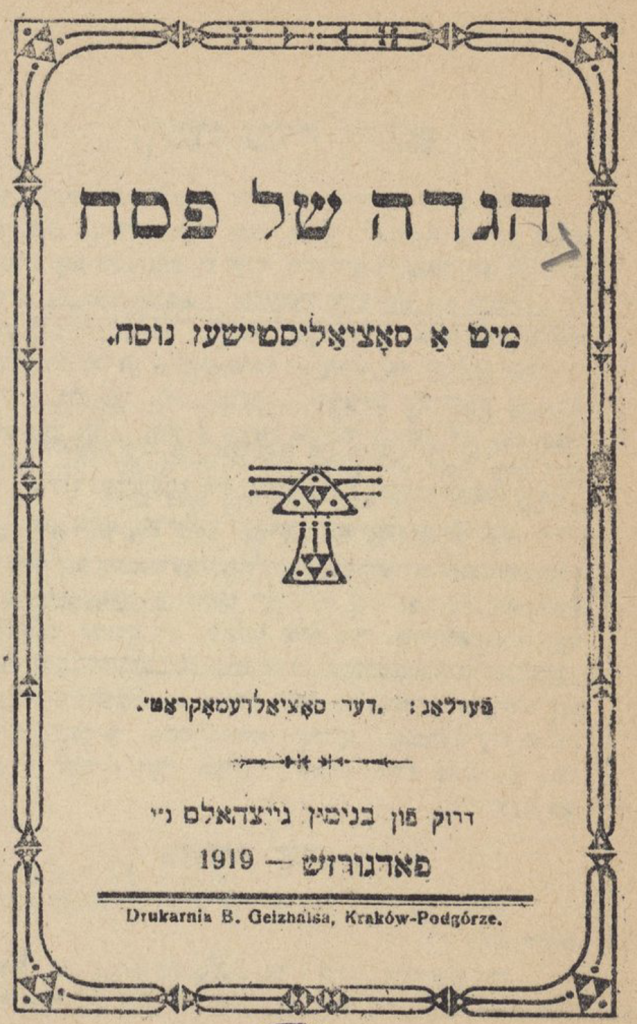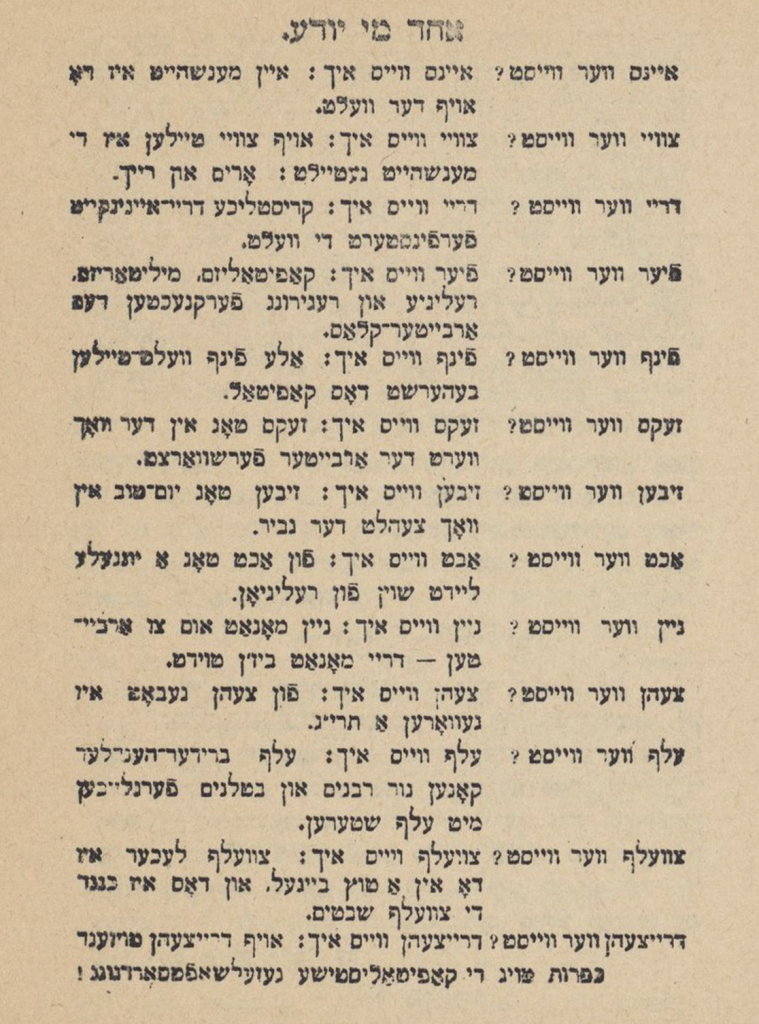Hagode shel Peysekh (with a Socialist Twist)
A translation of a 1919 Socialist Haggadah published by the Galician Bund.

The following are excerpts from a 1919 Haggadah published in Krakow-Podgorze by the Jewish Social Democrat Party, also known as the Galician Bund. This “Haggadah with a Socialist Nusekh” (“twist”) turns the Passover seder from a recounting of our deliverance from Egypt into a call for socialist revolution.

The Haggadah contains a fierce prophetic voice. In recalling our liberation from Egypt, it suggests that working Jews will free themselves from the yoke of their time because “we’ve already freed ourselves from the slave house once.” The Haggadah is also clear in its rejection of rabbinic authority. It portrays rabbis as collaborating with the Jewish upper classes to intentionally obfuscate Judaism’s true liberatory message. “What’s this!—[the rabbis and capitalists] say—slaves unite and free themselves! . . . What then would become of us in the world?” In its parody of “Chad Gadya,” titled “Chad Ovedyo”—“Ovedyo,” a mock Aramaic portmanteau between “gadyo” (kid), and “oyved” (worker)—the Haggadah blesses socialism as one would bless God. The inclusion of nonsense Aramaic words (Yiddish words with some Aramaic and Hebrew qualities) adds a playful and irreverent quality.
While Judaism provides the inspiration for this Haggadah’s call to revolution, it emphasizes repeatedly that Jewish ritual, however radical, does not a revolution make. “Only through violence were we liberated from Egypt, and so too only through violent struggle will we free ourselves today.” Whereas today many liberal Haggadahs interpret the ten plagues as social ills, the socialist Haggadah sees their violence as the necessary means to realize freedom from our oppressors.
- Shlomo Jack Jaron Enkin Lewis and Daniel Kaplan, Translators
THE FOUR SONS
Chochom ma hu oimer, what does the wise one say? The wise one asks: “ma ho’eidos v’hachukim v’hamishpotim asher tsivo Hashem eloiheinu eschem?” [What are the testimonies, statutes, and laws that God has commanded to you?] What kind of laws are these, that God gave you? How? Can a God truly give such laws, that all humankind should be dragged out, labouring and barely having enough to keep themselves going, while a small few should take everything away from them, and squander and indulge and live in a sea of serenity?
Roshe ma hu oimer, the wicked one, the parasite says: “ma ha’avoida hazois lachem.” What’s this work to you, why shouldn’t you work? A person must indeed work, a person was created to work! Work makes life sweet! Work, work children! “Lachem v’lo loi” [to you, but not to him]—only us does he order to work and become downtrodden, only us, and he himself doesn’t even lay a finger in cold water, and lives off our production! And because he removes himself from the collective, he is a “koifer b’iker” [a heretic to the core], he loses the fundamental awareness that all of humanity is born equal, and does not believe in the liberation of humanity: therefore we have nothing to do with him. “V’af ato hakacho es shiniui,” you should only set his teeth on edge and say: Remember that we’ve already freed ourselves from the slave house once, from Egypt, and we will from today’s yoke also certainly free ourselves. Ourselves and not him, for this slave master is our true enemy; he does not want the revolution and must surely fall.
Tam ma hu oimer, the simple honest person asks: “ma zois?” [What’s this?] What’s happening here between you? What are you fighting for? Over what are you struggling? Why don’t you just resolve this affair in good humour? V’amarto elav, to him you should answer: “B’chozek yad” [with a strong hand]. Only through violence were we liberated from Egypt, and so too only through violent struggle will we free ourselves today.
Ushe’eino yoideia lish’ol es pesakh loi, when one has no idea what to ask, you should explain to him simply the whole history of our former and present enslavement, and should say to him:
[The Haggadah continues with the Maggid, summarizing the history of the workers’ oppression, from Pharaoh to today.]
ECHOD MI YOIDEYA
Who knows one? I know one: One humanity in the whole world.
Who knows two? I know two: Humanity is split in two parts: poor and rich.
Who knows three? I know three: Christian trinity darkens the world.
Who knows four? I know four: Capitalism, militarism, religion, and government enslave the working class.
Who knows five? I know five: All five continents are under capitalist tyranny.
Who knows six? I know six: Six days a week the worker is downtrodden.
Who knows seven? I know seven: Seven days of rest is all the rich man knows.
Who knows eight? I know eight: Already from the eighth day, a young boy suffers from religion.
Who knows nine? I know nine: Nine months to work—three months to die.
Who knows ten? I know ten: Ten commandments became 613.
Who knows eleven? I know eleven: Only rabbis and lazybones can liken eleven brother-sellers to eleven stars.
Who knows twelve? I know twelve: There’s twelve holes in a dozen bagels, to equal to the twelve tribes.
Who knows thirteen? I know thirteen: The capitalist bosses are thirteen thousand times worse than useless!

CHAD OYVEDYO—ONE WORKER
Chad Oyvedyo, Chad Oyvedyo—one worker, Dezabin [that he bought]—which Abba Mastera bought—my father the master, B’treh zuzim—for two pennies. Chad Oyvedyo, Chad Oyvedyo.
V’oso [Then Came]—Then came, Batlin—a bum V’okhl [and ate] and beat out the worker that my father bought for two pennies. Chad Oyvedyo, Chad Oyvedyo.
V’oso Khanoinee [Then came, o merciful one]—Then came the shopkeeper and displaced the bum that beat out the worker that my father bought for two pennies. Chad Oyvedyo, Chad Oyvedyo.
V’oso Moileh—Then came the loan shark and gobbled up the shopkeeper that displaced the bum that beat out the worker that my father bought for two pennies. Chad Oyvedyo, Chad Oyvedyo.
V’oso Bankireh—Then came the banker and wolfed down the loan shark that gobbled up the shopkeeper that displaced the bum that beat out the worker that my father bought for two pennies. Chad Oyvedyo, Chad Oyvedyo.
V’oso Bankruptseh—Then came a bankruptcy and annihilated the banker that wolfed down the loan shark that gobbled up the shopkeeper that displaced the bum that beat out the worker that my father bought for two pennies. Chad Oyvedyo, Chad Oyvedyo.
V’oso Crisiseh—Then came a crisis and scorched the bankruptcy that annihilated the banker that wolfed down the loan shark that gobbled up the shopkeeper that displaced the bum that beat out the worker that my father bought for two pennies. Chad Oyvedyo, Chad Oyvedyo.
V’oso Harevolutsye hagdoylo [Then came the supreme revolution]—Then came the socialist revolution and demolished the crisis that scorched the bankruptcy that annihilated the banker that wolfed down the loan shark that gobbled up the shopkeeper that displaced the bum that beat out the worker that my father bought for two pennies. Chad Oyvedyo, Chad Oyvedyo.
V’oso HaSocialism Borukh Hu—Then came socialism—blessed may it be—and ended the revolution that demolished the crisis that scorched the bankruptcy that annihilated the banker that wolfed down the loan shark that gobbled up the shopkeeper that displaced the bum that beat out the worker that my father bought for two pennies. Chad Oyvedyo, Chad Oyvedyo.